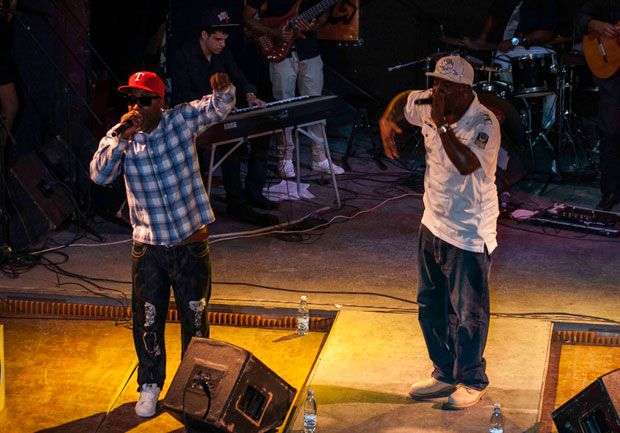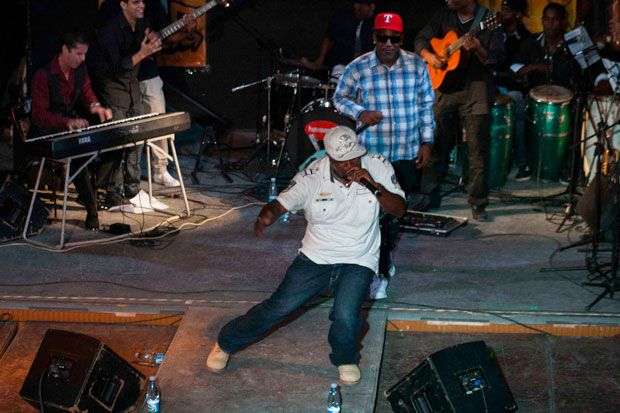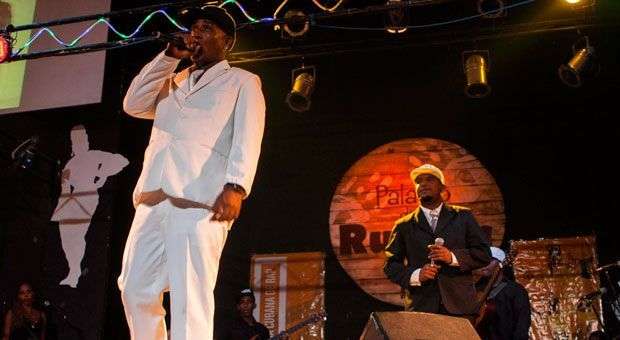Do not listen to Gardel. Twenty years it is something, it is a lot. If you don’t think that way, just ask Ruben Marin, director of First Base, hip hop pioneer group in Cuba. One seems to be his lucky number: Grand Prize at the first Festival of Alamar, in 1995, first Cuban rap album, Like you, in 1998, and last but not least, the first to get a CUBADISCO prize, that same year.
Listening to “black music”, which reached him up through his old FM Radio Selena, his attention was caught by those who were “talking over the rhythm.” Then the Funky boys were born, like that, so chic. “Look how far American influence reached”. While other rappers, unable to produce their own instrumental backgrounds, were using copied ones, they had from the start songs that were completely theirs.
They started with free style. “At one point we were able to master it as well and we did so often, we were enriching the vocabulary, being more consistent. Many times we opened it in the street: we were on the bus, we began to do free style and people were drawn to that. “
One day they realized that having an English name didn’t favor them, and on August 16, 1993, amid the hottest month of the special period, they became First Base. “We had no knowledge of the existence of other rappers in Cuba; we were trying to open a trail, as they say.”
It was the era of cassettes and chrome tapes. “At that time there was not rap, no nothin ‘, what for / but I tried / I opened the door for you today. / In those days you had to do it well / had to be good among good to break barriers. / The door was closed and I grabbed a bat / and hitting and slamming I entered the game. / Cuban culture said: What this thing is / is a foreign genre that today is ours “.
“It was hard, there was a huge crisis. By living that time we had many stories to tell. We always rely on social criticism, but after that maturity made us understand that we were very severe. I think it was a stage where there were many more things to say, and much to do. We scored exceptionally, the public was hungry for something new, and understood the power of words. “
The other two thirds of the group, Javier Duran (Doctor D) and José Angel Sastre (MC White), decided to continue, at the beginning of this century, as Cubanito 20-02. “There was disappointment among many rappers, a product of the same movement of hip hop and the media. The market has also led to those changes. They just looked for the formula to enter a market. Today I could have been a Cubanito 20-02, they made me the proposal and I said no, I wanted to remain First Base. At first the pain is, but eventually you realize that was the way that everyone should choose. “
Currently The Evil One(Yordani Romay) and Polish Dj (David Estrada) complete the team, expanding to other musical horizons, looking for a more mature style. His most recent album confirms it. Mix is just that: jazz rumba, hip hop blues, bolero and funk. It is a completely acoustic production, performed by the municipal band concert of La Lisa.
Projects range in an ambitious rope. “We’re cooking the idea of releasing some unreleased tracks. We did a version of Havana, by Los Safiros, and we want to record a whole album with songs of them in rap versions”.
Expanding the range also passes through the lyrics. Thus, for example, love is a door to address social issues: “I hit it with a girl of rather pale color / and people of my race said it was invalid / but since I don’t live with prejudice or problems / I moved forward and told myself / maybe she’s good “.
However, some still view with suspicion the genre experimentation. “We are not a religious sect, music is universal. Merge? Fusion jazz is a crime, when jazz was as discriminated as rap? Rumba? Merge ourselves with rumba is a crime, when we couldn’t listen to rumba here? “
For Ruben, who has also dabbled in reggaeton, its antagonism with hip hop is false. “Many have done both. Not everyone can be underground, for the same person who is listening to me singing political songs, also wants to dance. “
AM RAPPER, reads his sweater, full of pride. “I think there must be a social commitment, so that new generations see in us a way to break down barriers and find solutions. To me rap is a system of modern poetry, folk poetry, which allows us to say many things, do great things through music. “
In twenty years there have been many detractors, people who have said “you are crazy, rap is for Americans” or “stop that, my friend that does not give you anything.” “It’s that I’m not into hip hop because whether it gives me something or not, but because I like it”.
But there have been those who found inspiration in them, who consider them old school classics as people rappers from “the ninety-odd”. “Most of them tell us that we were a big influence, and that fills you with satisfaction.”
If we talk about recognition we must mention Guanabacoa. “I can say with tremendous pride that I’m from there, because the people in my district supported us unconditionally. We could gather two thousand souls in the Amphitheatre, sold out. “
Then gratitude becomes rhymes: “Yes, the curb from that corner / where day after day people keep flirting / where mulatto, brown / where black Merce still sounds the bembé / and I never leave /. Ashe I ask for you, for you, as I ask for health and faith for you.
Ruben has traveled across the country, for concerts and auditions of the Cuban Rap Agency, where shared as a juror with renowned musicians. “They want to learn from us and we have to learn from them, that’s where the integrity and integration into the national culture is.”
Having lived all stages of hip hop movement in Cuba allows him to tackle successes and shortcomings. “We have achieved to integrate into the system and professionalize ourselves, we have crossed international barriers, for the world to value us and tell us that there is a very good Cuban rap. But, although we all know, we are working in isolation, not as a movement. “
Worried about how to project the rappers in society, he advocates for its preparation, culture to be carried inside and out. “The way you say is very important, is how people see us.”
The recently concluded 9th Symposium of Cuban Hip Hop was dedicated to the two decades of First Base. Events like this make you think in time, in being aged, as the theme “You never know what will happen tomorrow / if people remember you / if you greet the kiddos”.
This rapper has a graying goatee, once he tried to delete it from his face, even disguised it with black dye. “It looked hot” he says laughing. But the math does not fail: if he founded the group at 19, and it’s been 20 years, he is 39. Half a life making rap. (Is that not enough, Gardel?!).
Now he dusts texts he doesn’t even remember writing, ventures into the visual, imagine a “command post” to guide future generations. “Sometimes I was shocked because I have been told, you’re old Ruben, and you carry a stack of years. At that time I react and wonder: Am I truly old? Naa!, I think not, I think not. “












